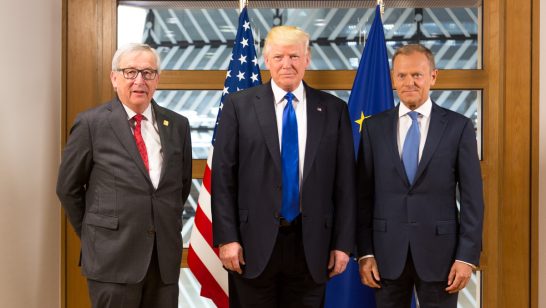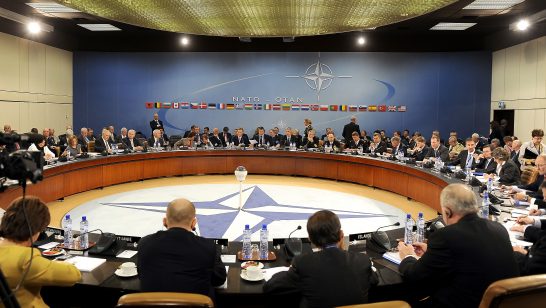
Assessing the 2017 NATO meeting: expectation vs reality
Results should always be measured against expectations. This principle is particularly valid when attempting to assess the outcome of the meeting of NATO’s Heads of State and Government, held in Brussels on May 25. Expectations were high because this was the first encounter of other Alliance leaders with the recently elected American President, NATO’s traditional leader.
During his election campaign, Mr. Trump declared that the Alliance was obsolete. He vehemently denounced what he perceived as an imbalance in burden-sharing as being detrimental to the interests of the United States. Consequently, NATO leaders attended the Brussels meeting in the hope that it would prove to be an opportunity for the President to dispel allies’ doubts about Washington’s continuing commitment to NATO solidarity. In particular, a clear and solemn reaffirmation of adherence to Article 5 of the North Atlantic Treaty by President Trump would have been of notable significance. Moreover, an explicit reference by the President to this mutual defence clause would have been proof that he was finally starting to follow the long-established principles of American foreign policy. In the media, the expectation to hear a positive statement from President Trump about Article 5 grew as the Brussels meeting approached.
At the same time, many also argued that it would be unrealistic to expect a dramatic change of course and that avoiding additional controversy on the President’s part could be considered a sufficiently satisfactory result.
There were also those who did not disguise their hope that the President would adopt a course of action that would spoil the Brussels meeting and reinforce doubts over the direction in which he is taking the United States.
What was achieved?
In fact, neither anything extremely positive nor negative took place.
The pattern of President Trump’s statements and actions since taking office – which made the summit a vital opportunity to shed more light on the future of the transatlantic relationship – should have lowered expectations of its outcome.
A fair assessment of what was achieved in Brussels would be that it was anything but a defining moment for the Alliance. Endeavouring to put a positive gloss on the deliberations, NATO’s leaders implied that their hope was that, over time, President Trump would gradually align himself with those in Washington who have a more traditional view and a better understanding of the Alliance. In the meantime, doubts still surround the new President’s vision and interpretation of the transatlantic coupling embodied by NATO.
The value of unifying US leadership within NATO
The reason for this lukewarm assessment is not so much that the President omitted from his speech any reference to Article 5 – serious and worrying as this omission undoubtedly is – or even that he substituted it with an anodyne and vaguely indirect formulation of US commitment. In any case, in meeting the President of Romania on June 9, he finally made the long awaited reference to Article 5. The reasons for concern stem from problems much wider in nature.
It is worth remembering that Article 5 of the Atlantic Treaty, which is not automatically applicable in a case of aggression against a NATO member and was invoked only after September 11, 2001, has retained its credibility so far thanks to the fundamental principles shared by all the Allies during the Cold War era: that their security was indivisible and that it was in all their national interests to unite in common defence.
After the demise of the Soviet Union the threat perception within NATO was less unified and differences of opinion emerged. However, the debate was conducted within the limits of a constructive inter-allied dialectic, thanks to strong US leadership.
The Trump Administration’s attitude toward NATO
With the advent of Trump, a lack of awareness of the historical importance of the transatlantic link has manifested itself in the White House. The President and his closest advisors seem to underestimate that NATO has been, and is, an instrument to ‘make America great’ by consolidating its power and influence.
Crucial issues, such as how future European order will develop, how to interact with an ever more problematic Russia, what is the potential (or lack of potential) for NATO to expand its role and what limits there might be on that, apparently escape the attention and interest of the President.
It is unlikely that the reinstated commitment by reluctant allies to increase their defence budgets will be enough to change hearts and minds within the White House. It remains to be seen whether the announcement of an enhanced role for NATO in combating terrorism will significantly change Trump’s attitude towards the Alliance. Terrorism is a multifaceted phenomenon. It is realistic to expect that there will be different views among the allies as to what form an enhanced NATO role might take in order to make a difference on the ground without further destabilizing already fragile areas of the world.
‘Strategic patience’: how Europeans should react to Trump
It is clear that, even in the most positive scenario, Europe-US relations are subject to change. Indeed they have already changed. This demands that Europeans should consolidate their common foreign and defence policy in a convincing and concrete manner. It would be wise to avoid hubris as this will be a long and difficult process. There are considerable differences within the EU and without the encouragement and support of the United States these differences could prove a formidable obstacle to progress or, at the very least, delay results.
One principle should, in any case, be borne in mind. Just as it is of paramount national interest to the US to safeguard the transatlantic relationship, it remains an equally vital, collective European objective to protect Europe’s relationship with the United States.
In this respect, understandable as her frustration and irritation might be, Chancellor Merkel’s statement after the meetings in Brussels and Taormina sounded like a nervous overreaction. This is likely due more to the extensive disagreement with Trump over climate change and free trade at the G7 than to the NATO summit. The ensuing ‘clarification’ could not dispel the impact of the initial message. Today, as it stands, no-one can predict how the Trump presidency will evolve. Europeans can only adopt ‘strategic patience’ while trying to exercise maximum constructive influence in Washington. They should try to meet reasonable US expectations, including the sacrosanct request for a gradual increase in defence budgets. This should take place while attending to the essential but hazardous task of assuming and affirming their own responsibilities on the world stage.
The opinions articulated above represent the views of the author(s), and do not necessarily reflect the position of the European Leadership Network or any of its members. The ELN’s aim is to encourage debates that will help develop Europe’s capacity to address the pressing foreign, defence, and security policy challenges of our time.



